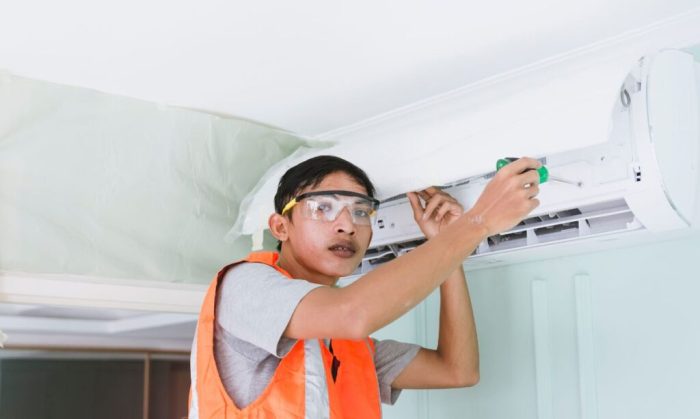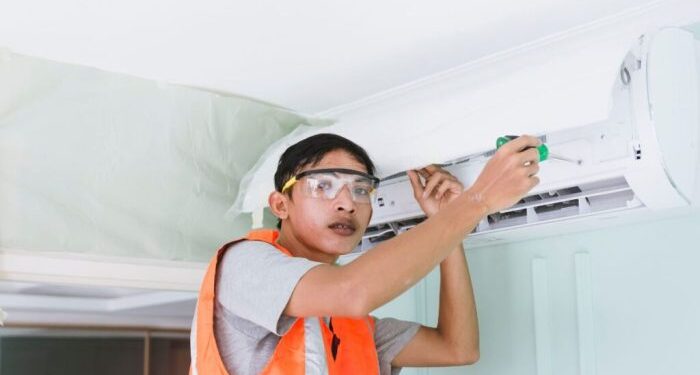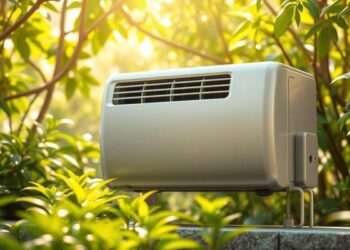As we delve into the topic of Signs It’s Time for an Air Conditioner Replacement, we uncover pivotal signs and factors that signify the need for a new cooling system. From unusual sounds to energy efficiency concerns, this discussion sheds light on crucial aspects homeowners should be aware of.
Exploring further, let's delve into the specific indicators and considerations that play a significant role in determining when it's time to replace your air conditioner.
Signs of Air Conditioner Issues
When your air conditioner starts showing signs of trouble, it may be time to consider a replacement. Here are some common indicators that your air conditioner may need to be replaced:
Unusual Sounds
Unusual sounds coming from your air conditioner, such as banging, rattling, or squealing noises, can be a sign of a failing system. These noises may indicate issues with the compressor, motor bearings, or other internal components that could be costly to repair.
Poor Airflow or Lack of Cool Air
If you notice that your air conditioner is not blowing cold air or if there is poor airflow coming from the vents, it could be a sign that your system is struggling to cool your home effectively. This could be due to a refrigerant leak, a failing compressor, or blocked ductwork, all of which may require a replacement.
Frequent Breakdowns
Experiencing frequent breakdowns or the need for constant repairs can be a clear indication that your air conditioner is reaching the end of its lifespan. Constant repairs can add up quickly and may end up costing you more in the long run than investing in a new, more efficient system.
Age of the Air Conditioner
As air conditioners age, they are prone to a decline in efficiency and performance, leading to increased energy consumption and potential breakdowns. Understanding the typical lifespan of an air conditioner and when it's considered old can help homeowners make informed decisions about replacement.
Typical Lifespan and Considerations
On average, the lifespan of a central air conditioner is around 15 to 20 years, while window units may last for about 10 years. However, factors such as proper maintenance, usage frequency, and environmental conditions can affect the longevity of an air conditioner.
Once an air conditioner reaches 10-15 years, it is considered old and may start showing signs of wear and tear.
Impact on Efficiency and Performance
- Older air conditioners tend to be less energy efficient, leading to higher electricity bills.
- Decreased cooling capacity and uneven cooling are common issues with aging units.
- Noisy operation and frequent cycling on and off can indicate a struggling system.
Technological Advancements and Upgrades
Advancements in air conditioning technology have led to the development of more energy-efficient and environmentally friendly units. Newer models often come with features like programmable thermostats, variable-speed compressors, and smart controls that enhance comfort and reduce energy consumption. Therefore, upgrading to a newer model may be necessary to enjoy these benefits.
Frequency of Repairs and Replacement
- Older air conditioners may require more frequent repairs, leading to increased maintenance costs over time.
- If repair costs start to outweigh the value of the unit or if the system constantly fails to keep up with cooling demands, it may be more cost-effective to invest in a new air conditioner.
Energy Efficiency Concerns
When it comes to air conditioners, energy efficiency is a crucial factor to consider. Not only does it impact the environment, but it also affects your monthly utility bills.
Importance of Energy Efficiency
- Energy-efficient air conditioners consume less electricity, leading to lower energy bills.
- Reduced energy consumption also means a smaller carbon footprint, contributing to a more sustainable lifestyle.
- Newer models with higher energy efficiency ratings often come with advanced features that improve overall comfort and performance.
Comparison of Energy Efficiency
- Older air conditioners tend to be less energy-efficient due to wear and tear over time.
- Newer models are designed with advanced technology that maximizes cooling output while minimizing energy input.
- Upgrading to a more energy-efficient unit can result in significant cost savings in the long run.
Benefits of Upgrading
- Lower energy bills: An energy-efficient air conditioner can help reduce your monthly cooling costs.
- Improved comfort: Newer models provide better temperature control and humidity regulation.
- Environmental impact: By using less energy, you can reduce your carbon footprint and contribute to a greener planet.
Indicators for Replacement
- High energy bills: A sudden increase in energy costs could signal that your air conditioner is no longer operating efficiently.
- Frequent repairs: If your unit requires constant repairs, it may be more cost-effective to invest in a newer, more energy-efficient model.
- Aging system: As air conditioners age, their efficiency tends to decline, making it a good time to consider a replacement.
Environmental Impact

Older, less efficient air conditioners can have a significant negative impact on the environment due to their higher energy consumption and greenhouse gas emissions. These units often use outdated technology that requires more electricity to operate, leading to increased carbon dioxide emissions and contributing to global warming.
Upgrading to a more environmentally friendly air conditioner can bring several benefits. Newer models are designed to be more energy-efficient, using advanced technologies that require less electricity to cool your home effectively. By reducing energy consumption, these air conditioners help lower carbon emissions and minimize the overall environmental impact.
Eco-Friendly Features in Newer Air Conditioner Models
- Energy Star Certification: Many modern air conditioners are Energy Star certified, meaning they meet strict energy efficiency guidelines set by the Environmental Protection Agency. These units consume less energy, resulting in lower electricity bills and reduced environmental impact.
- Variable Speed Compressors: Some newer air conditioners come equipped with variable speed compressors that adjust their operation based on cooling needs. This feature helps optimize energy usage and maintain consistent indoor comfort levels without wasting electricity.
- Eco-Friendly Refrigerants: Newer air conditioners often use environmentally friendly refrigerants that have lower global warming potential compared to older, ozone-depleting refrigerants. By using these eco-friendly refrigerants, you can help protect the ozone layer and reduce greenhouse gas emissions.
Reducing Carbon Footprint by Replacing an Old Air Conditioner
Replacing an old, inefficient air conditioner with a newer, more energy-efficient model can significantly reduce your carbon footprint. By upgrading to a unit that consumes less energy, you can lower your home's overall greenhouse gas emissions and contribute to a healthier environment.
Additionally, the energy savings from a more efficient air conditioner can help offset the environmental impact of manufacturing and disposing of the old unit.
Closing Notes
In conclusion, understanding the signs and factors signaling the necessity for an air conditioner replacement is essential for maintaining a comfortable and efficient home environment. By recognizing these key indicators, homeowners can make informed decisions to enhance their cooling system's performance and longevity.
FAQ Guide
How can I tell if my air conditioner needs to be replaced?
Look out for signs like unusual sounds, poor airflow, frequent breakdowns, and escalating energy bills, which indicate the need for a replacement.
What is the typical lifespan of an air conditioner?
Air conditioners usually last around 10-15 years, but factors like maintenance and usage can impact longevity.
Why is energy efficiency important in air conditioners?
Energy-efficient units can lead to cost savings on utility bills and reduce environmental impact by consuming less power.
How do newer air conditioner models benefit homeowners?
Newer models offer enhanced energy efficiency, advanced features, and improved performance, providing better comfort and savings.
What eco-friendly features can be found in modern air conditioners?
Modern air conditioners may include features like programmable thermostats, energy-saving modes, and environmentally friendly refrigerants to reduce carbon footprint.





![How To Avoid Contractor Scams [Infographic]](https://airconditioner.infotangerang.id/wp-content/uploads/2025/10/how-to-avoid-contractor-scams-feat-120x86.png)








